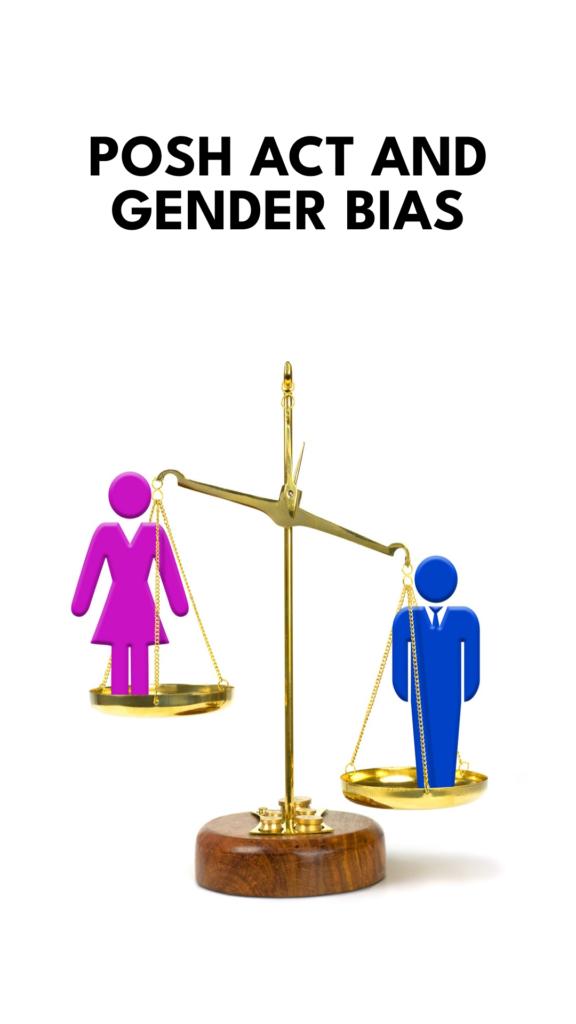The Sexual Harassment of Women at Workplace (Prevention, Prohibition, and Redressal) Act, 2013, also known as POSH Act, is an Indian legislative act that tries to protect women against sexual harassment at work. The Act came into force on December 9, 2013. This Act substituted the Supreme Court of India’s Vishaka Guidelines for Prevention of Sexual Harassment (POSH). The preamble of our constitution guarantees all citizens “equality of status and equal protection.” Articles 14, 15, and 21 guarantee equal legal protection, protection from all types of discrimination, and protection of life and personal liberty.

Table of Contents
Convention on the Elimination of All Forms of Discrimination Against Women (CEDAW)
“Society as a whole benefits immeasurably from a climate in which all persons, regardless of race or gender, may have the opportunity to earn respect, responsibility, advancement and remuneration based on ability.”
– Sandra Day O’Connor, Former Associate Justice of the Supreme Court of the United States
On July 30, 1980, India signed the Convention on the Elimination of All Forms of Discrimination Against Women (CEDAW), which it ratified on July 9, 1993. It is an international treaty that establishes states’ responsibility to protect women’s human rights. As a result, India is required by the treaty to ensure gender equality and to prohibit gender discrimination against women. The International Labour Organization (ILO) held a seminar in Manila. Sexual harassment in the workplace was declared an affront to women’s dignity and a form of gender discrimination in 1993. Thus, international accords and agreements underscore the necessity to combat sexual harassment in the workplace.
Importance of POSH Act
The POSH Act is women-specific legislation that was enacted solely to protect women from sexual harassment at work. Certain issues have been expressed about the law’s lack of gender neutrality over time. The argument that women bear a larger brunt of this problem than men is unjustified. Also, when it comes to gender neutrality in laws, the debate has always been around the binary genders, i.e., men and women. However, there is non-binary gender too, i.e., third gender, which has been facing discrimination and stigma for a long period of time. Whether this Act allows men to file a complaint or not can be proven by concerning following sub-heads.
Is POST Act gender-neutral or gender-biased?
The answer to this question can be seen through 2 eyes:
Firstly, it’s gender-neutral when we talk about the definition of “respondent” given under Section 2(m) under the said Act. As through many judgements and arguments it’s been held that a woman can bring a suit against any woman, man or even member of third gender. For instance, a woman can file a suit against a woman, i.e., both the women are kept on the same footing. Then in such case it’s a gender neutral law.
Secondly, it is gender-biased when the definition of “aggrieved woman” given under Section 2(a) itself includes women only. Only women can file a complaint or suit. This Act came into force with the motto to protect women only. This will not only make the other people feel secure but also lead to a decrease in general dissatisfaction from the Act. That’s why this act is gender-biased.
Gender bias
It is difficult to obtain figures on the number of cases of sexual harassment against men. Most sexual harassment instances involving men go unreported because there are few laws that protect men from sexual harassment. Even while Article 14 of the Indian Constitution mentions the right to equality, this is not the case when it comes to sexual harassment protection. Only women are considered victims of workplace sexual harassment under the Sexual Harassment of Women at Workplace (Prevention, Prohibition, and Redressal) Act 2013. According to the Act, only women can bring a sexual harassment complaint.
It is true that the Act appears to be tilted in favour of women. Discussions are still ongoing. As the Act solely protects women, men and LGBTQ people continue to face harassment. As of present, there is no structure in place under the POSH Act to address such incidents, which ultimately leads to prejudice in the workplace environment.
Is the POSH Act helpful?
Despite the fact that the Act was enacted to preserve equality and diversity in companies, it serves no purpose. Since it protects no one other than women. While some women may feel empowered, others may feel discriminated against. What is the solution to this problem? Making the corporate POSH policy gender neutral may appear to be a viable approach. This means that anyone can register a complaint with the IC (Internal Committee). It gives the IC the authority to investigate situations involving both genders.
Though this appears to be an appropriate approach, there are a few legal issues
The Act forbids gender neutral organizational policies. The Act grants the IC the authority of a civil court while investigating issues under the Act. This means that IC has the authority of a civil court only when the cases are brought by female employees. The powers granted in IC, such as the right to summon complainant, respondent, and witnesses for questioning; demand documents as evidence; or recommend actions once the investigation is done, are solely relevant to a complaint lodged by a female employee.
What is the solution?
While it is true that India lacks laws to protect males from sexual harassment, it is not the case that all laws prohibiting sexual harassment in our country are geared primarily at women:
- Section 377 of the IPC makes sodomy without consent a crime. This statute recognizes males as rape victims. However, when the culprit is a woman, this part is irrelevant.
- In terms of perpetrator and victim, the Protection of Children from Sexual Offenses Act of 2012, which criminalizes sexual harassment of anyone under the age of 18, is gender neutral.
- The Criminal (Amendment) Act 2013, also known as the Nirbhaya Act, views offenses such as acid attack and attempted acid attack as gender-neutral. Anyone, regardless of gender, can make a complaint under the Acid Attack and Attempt to Acid Attack sections.
- The University Grants Commission (Prevention, Prohibition, and Redressal of Sexual Harassment of Women Employees and Students in Higher Educational Institutions) Regulations, 2015 is also gender-neutral.
What can the organization do?
The organization can nonetheless safeguard its non-female employees by implementing a separate policy on harassment and sexual assault as part of the organization’s service guidelines. Basically, there are two Redressal bodies- one is Disciplinary Committee and another one is Internal Committee. In this policy, IC (Internal Committee) is given the authority to investigate accusations of sexual harassment. This is valid for both men and women.
Another successful strategy to prevent sexual harassment against men is training and awareness development. Undertaking of regular trainings that address sexual harassment as a crime against anyone, not just women. Use the training to send a clear message that sexual harassment will not be allowed. This is regardless of the victims or perpetrator’s gender or title. It should also cover the complaint methods available to male employees.
Conclusion
Based on the preceding debate, we can conclude that the current legislative framework is insufficient. There is a need to fill gaps based on the modern reality. There needs to be a significant shift in how we view sexual harassment laws. Our fight here is against our society’s patriarchal worldview. The state’s approach to sexual harassment in the workplace must alter. It is necessary to make laws more inclusive of males in order for them to effectively enjoy their rights. Until such revisions are approved by the legislature, organizations can develop gender neutral policies to deal with sexual harassment at work. Some organizations already do.
Join the LLA telegram group for frequent updates and documents.
Download the telegram group and search ‘Labour Law Advisor’ or follow the link – t.me/JoinLLA
It’s FREE!



